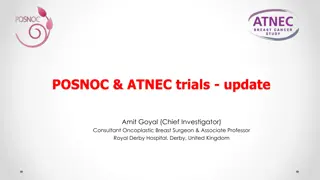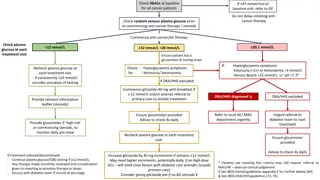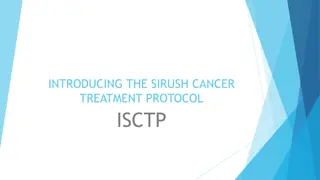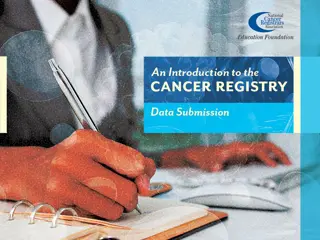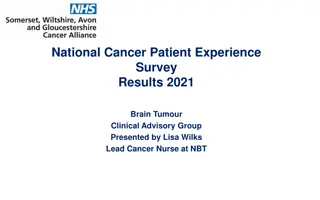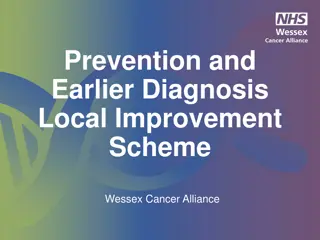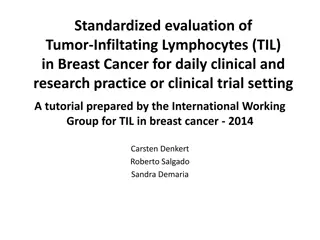Cancer Therapy Evaluation Program (CTEP) Overview
The Cancer Therapy Evaluation Program (CTEP) aims to enhance cancer patients' lives by advancing cancer treatment through research and clinical trials. The Program includes a Protocol and Information Office (PIO) to streamline trial development processes. It funds national cancer research and focuses on translational research to understand drug effects. CTEP also organizes document reviews, phase meetings, and drug development teams for efficient progress in cancer care.
Download Presentation

Please find below an Image/Link to download the presentation.
The content on the website is provided AS IS for your information and personal use only. It may not be sold, licensed, or shared on other websites without obtaining consent from the author. Download presentation by click this link. If you encounter any issues during the download, it is possible that the publisher has removed the file from their server.
E N D
Presentation Transcript
CTEP Protocol and Information Office (PIO) Overview
CTEP MISSION The mission of the Cancer Therapy Evaluation Program (CTEP) is to improve the lives of cancer patients by finding better ways to treat, control and cure cancer. CTEP accomplishes this mission by funding an extensive national program of cancer research and by sponsoring clinical trials to evaluate new anti-cancer agents, with a particular emphasis on translational research to elucidate molecular targets and mechanisms of drug effects.
CTEP Organization Chart Associate Director
Mission of the PIO The primary mission of the PIO is to facilitate the development of quality clinical trials in the most efficient and expeditious manner possible and to relieve the administrative burden related to clinical trial development and management on CTEP staff and the extramural community.
CTEP Document Reviews Document Phase Meeting Acronym CTEP Review Day/Time Scheduling Additional Review n/a IDB Wed 9-11:30am Date per lead reviewer PRC PTMA 0, 1, 2, Pilot IDB Wed 9-11:30am Rec d by 5PM Tue., 1 week later PRC, BRC1 (if needed) Thur 8-9am LOI 2, 2/3, 3 CRM Wed 11:30am-1:30pm Date per lead reviewer but prior to SC SC2 (always) Concept Other CCSC CTEP Review Wed 11:30am-1:30pm Date per lead reviewer but prior to CCSC NCTN-CCSC (always) CSC all PRC Thur 9am 12noon Rec d by 5PM Tue., 2 weeks later BRC (if needed) Thur 8-9am Protocol 1. BRC: Biomarker Review Committee (composed of NCI experts in biomarkers; submissions for review decided at PRC) SC: Disease-Specific Steering Committee (composed of leading cancer experts and advocates from outside the NCI as well as NCI Senior Investigators; each SC meets monthly) NCTN-CCSC: NCTN Core Correlative Sciences Committee (comprised of representatives from the NCTN and NCI who have expertise in oncology, laboratory science, translational medicine, pathology, statistics, biobanking, and patient advocacy; meets monthly) 2. 3.
Project Team Member Application (PTMA) The Project Team Member Application is the form used by investigators to submit for opportunities in the NCI Experimental Therapeutics Clinical Trials Network (ETCTN). There are three categories of applicants: - Clinician scientists - Translational scientists - Basic Scientists Selected applicants are invited to participate on a Drug Project Team
Drug Project Team The team is composed of: Extramural members (Clinical, Translational, and Basic Scientists) Intramural members selected by IDB staff: IDB Drug Monitor (co-chair) Disease expert(s) from CIB Biomarker expert(s) from CDP and others Intramural basic scientists with relevant expertise Others TBD A drug development plan is designed by the team. Selected clinical scientists from the team develop the LOIs and form protocol development teams.
Letters of Intent (LOI) Review A Letter of Intent (LOI) is a proposal submitted by an investigator interested in conducting Phase 1 or 2 single or combination studies most often utilizing CTEP-held IND investigational agents. A protocol cannot be submitted until the LOI has been approved.
LOI Review Process LOI Review Process LOIs received in PIO by Thursday 5pm ET are abstracted by Tuesday and scheduled by PIO for review the following week on Wed. (IDB) and Thur. (PRC). PIO distributes LOIs to all reviewers electronically LOI decisions (approved/disapproved/On Hold) made at PRC; however, if a BRC review of component biomarkers is required this will delay final decision Consensus Reviews are submitted to PIO for distribution to PI/site Final Approval provided to PI/site by PIO once all CTEP comments are resolved by PI and any drug commitments (investigational) received.
Concept Review Concepts represent the investigator s desire to conduct a Phase 2 or Phase 3 study. These studies typically focus on using an agent to treat a specific disease, and the concept review is conducted by the CTEP Clinical Investigations Branch (CIB) which serves as the disease experts for CTEP. Concepts are typically submitted by NCTN Groups and Consortiums due to the target patient accrual needs for conducting these type of trials.
Concept Review Process All Phase 2, Phase 2/3, and Phase 3 concepts are reviewed by the NCI disease-specific Steering Committees (SC). However, CTEP performs their review prior to the SCs. Phase 2 Concepts are scheduled for PRC review within 2 weeks of receipt Phase 2/3 and Phase 3 Concepts are reviewed at the Concept Review Meeting (CRM) on a Wednesday (11:30am 12:30pm ET or 12:30pm 1:30pm ET) at the Lead Reviewer s date of choosing. The group must submit their new concept within 4 weeks of the next SC call. New Concept submissions are sent to reviewers electronically After CRM, the CIB lead reviewer attends the SC review. The Consensus Review (CR) is written by Steering Committee members and sent to CTEP CIB lead reviewer The CIB lead reviewer sends the CR to PIO and requests decision cover letter to be generated and sent to CIB Branch Chief PIO distributes the CR and cover letter to the lead organization If required, a revised concept is submitted 2 weeks prior to next SC call
Review/Evaluation Process for CTEP- supported NCTN Treatment Trials Phase 2 Phase 1 Phase 2/3 Phase 3 (+/- minor dose finding and includes Phase 1/2 studies) Response to CTEP Solicitation? (regardless of sample size) Yes No No <100 Patients (total sample size) 100 Patients (total sample size) Any Size Non-CTEP IND CTEP IND Solicited LOI Unsolicited LOI Unsolicited LOI Concept Concept Unsolicited LOI LOI Review by CTEP PRC (regardless of IND status) NCI SC Evaluation * NCI SC Evaluation * (regardless of IND status) LOI Review by CTEP PRC LOI Review by CTEP PRC LOI = Letter of Intent SC = Steering Committee * Studies of diseases without SCs (i.e., Melanoma and Sarcoma) will be reviewed by CTEP PRC
CSC (Correlative Science Committee) Review The NCTN Core Correlative Sciences Committee (NCTN-CCSC) is charged with scientific review and prioritization of proposals requesting use of banked, non-reserved biospecimens collected from NCTN clinical trials for use in correlative science studies. The NCTN-CCSC has oversight for ensuring optimal use of these irreplaceable clinical trial biospecimens.
CSC Review Process Investigators seeking to use biospecimens from NCTN Phase 3 cancer clinical trials must submit a CSC Proposal for NCTN- CCSC review. However, CTEP performs their review prior to the NCTN-CCSC. CSCs are reviewed at the CRM / CCSC CTEP review meeting on a Wednesday (between 11:30am 1:30pm ET) at the Lead Reviewer s date of choosing. New CSC submissions are sent to reviewers electronically. After the CCSC CTEP review, the CIB Lead Reviewer attends the NCTN- CCSC review. The Consensus Review (CR) is written by NCTN-CCSC members and sent to the CIB Branch Chief for signature by the NCTN-CCSC Coordinator. PIO distributes the CR to the lead organization If required, a revised CSC is submitted. Final approval provided to the lead organization once all review comments are resolved and drug company approval has been received, if applicable.
Initial Protocol Review Protocols are the detailed plan of treatment for a clinical trial. Protocols are submitted following the approval of an LOI or Concept. Protocol Review Process New Protocols received in PIO by Tuesday 5pm ET are scheduled for PRC review 2 weeks later. A copy of each Protocol is attached to the Preliminary PRC Agenda email on Friday. Individuals assigned to review the study are also sent a copy through SharePoint. Decision on protocol submission determined at PRC. PIO staff combine comments from the individual reviewers into one consensus review document. Once the Lead Reviewer finalizes the consensus review it is sent to the PI/Lead Organization.
Protocol Revisions Protocol Revisions are changes made to the protocol prior to CTEP approval. If the lead organization is responding to CTEP review comments, they must address each comment in the Summary of Change (SOC). The SOC must be located at the beginning of the protocol and consent. It must also include hyperlinks that bring the reviewer to the location within the protocol or consent where the change has taken place. Revisions are received in PIO and routed electronically to all reviewers. 48 hours provided to each reviewer. 48-hour reminder sent if review not returned to PIO. PIO sends final decision notice to PI and lead organization.
Protocol Amendments Protocol Amendments are changes made to the protocol after CTEP approval. Amendments have the same formatting requirements as revisions. They are also routed electronically to reviewers who are given 48 hours to complete their review. PIO sends the final decision notice to the PI and lead organization.
OEWG Timeline Info The Operational Efficiency Working Group (OEWG) was established to advise the National Cancer Institute (NCI) on strategies to "Identify the institutional barriers that prolong the time from concept approval to accrual of the first patient, and develop solutions for overcoming these barriers." The collaborative effort includes representation from the NCTN, ETCTN, Cancer Centers, Consortiums and other NCI Programs and Divisions. This broad-based, strategically-driven effort, involving all the critical stakeholders in the cancer clinical trials community, resulted in the initiatives and associated implementation plans detailed in this report on "Compressing the Timeline for Cancer Clinical Trial Activation".
OEWG Timeline Info (cont.) OEWG Timeline information found on CTEP website: http://ctep.cancer.gov/ SOPs and Timeline charts available Applies only to CTEP treatment trials Start Date for Timeline begins at LOI or Concept review date LOI tied to the IDB or PRC review date Concept tied to SC review date for new concepts (3 weeks prior to actual SC review) CTEP Secure Website tracks OEWG Timelines
Phase 1, 1/2, and 2 LOIs OEWG Timeline OEWG timeline for opening a trial to enrollment, for Phase 1, 1/2, and 2 LOIs: Absolute deadline: 400 days Phase 1, 1/2, and 2 LOIs include the following: ETCTN and Unsolicited LOIs phase 1, 1/2, and 2 NCTN and Consortia phase 1, 1/2, and 2 LOIs LOI approval stage: 60 days (Day 1 60) Protocol authoring stage: 60 days (Day 60 120) Protocol approval and open to enrollment: 280 days (Day 120 400) (Please see timeline flowchart on next slide.)
Phase 1, 1/2, and 2 LOIs OEWG Timeline (cont.) Stage 1: LOI approval Target = 60 days NCI approval and if needed, pharmaceutical collaborator approval, plus approval of biomarker plan Submission of the Letter of Intent (LOI) to the NCI NCI review and conference call with investigators Stage 2: Protocol submission Target = 60 days Protocol Authoring and submission to the NCI for review Stage 3: Protocol Approval and Activation Target = 280 days Site finalization: CIRB/IRB approval, contract negotiations, FDA review, etc. NCI Review and conference call with investigators Final approval and activation of the trial Submission of the protocol to the NCI Approval of the protocol documents by the NCI Absolute deadline for opening trial to enrollment is 400 calendar days
NCTN Group Phase 2 (and 1/2) Concepts OEWG Timeline OEWG timeline for opening a trial to enrollment, for NCTN Group Phase 2 (and 1/2) Concepts: Absolute deadline: 450 days NCTN Group Phase 2 (and 1/2) Concepts include the following: NCTN Group phase 2 (or 1/2) Concepts > 100 patients Phase 2 concept approval stage: 60 days (Day 1 60) Protocol authoring stage: 60 days (Day 60 120) Protocol approval and open to enrollment: 330 days (Day 120 450) (Please see timeline flowchart on next slide.)
NCTN Group Phase 2 (and 1/2) Concepts OEWG Timeline (cont.) Stage 1: Concept approval Target = 60 days NCI approval and if needed, pharmaceutical collaborator approval Initial Steering Committee review of the Concept Consensus Review and conference call with investigators Stage 2: Protocol submission Target = 60 days NCI approval and if needed, pharmaceutical collaborator approval Protocol submission to the NCI for review Stage 3: Protocol Approval and Activation Target = 330 days Final approval and activation of the trial Site finalization: IRB approval, contract negotiations, FDA review, etc. NCI Review and conference call with investigators Approval of the protocol document by the NCI Submission of the protocol to the NCI Absolute deadline for opening trial to enrollment is 450 calendar days
Phase 3 Concepts OEWG Timeline OEWG timeline for opening a trial to enrollment, for Phase 3 Concepts: Absolute deadline: 540 days Phase 3 Concepts include the following: All Phase 3 Concepts. Concept approval stage: 90 days (Day 1 90) Protocol authoring stage: 90 days (Day 90 180) Protocol approval and open to enrollment: 360 days (Day 180 540) (Please see flowchart timeline on next slide.)
Phase 3 Concepts OEWG Timeline (cont.) Stage 1: Concept approval Target = 90 days NCI approval and if needed, pharmaceutical collaborator approval Consensus review and conference call with investigators Initial Steering Committee review of Concept Stage 2: Protocol submission Target = 90 days NCI approval and if needed, pharmaceutical collaborator approval Protocol submission to the NCI for review Stage 3: Protocol Approval and Activation Target = 360 days NCI Review and conference call with investigators Site finalization: IRB approval, contract negotiations, FDA review, etc. Final approval and activation of the trial Submission of the protocol to the NCI Approval of the protocol document by the NCI Absolute deadline for opening trial to enrollment is 540 calendar days
Other PIO Functions Distributes safety information to relevant clinical sites Assists in the submission of protocol related documents to the US Food and Drug Administration (FDA) Provides administrative support to the IDB, PRC, BRC CRM, and CCSC meetings Maintains administrative documentation for the conduct of CTEP reviews and progress of CTEP- sponsored clinical trials
PIO Contact Info Head (Federal Position): Martha Kruhm Deputy Head (Federal Position): Charles Choi Program Manager: Sheryl Kiernan Deputy Program Manager: Nwanneka Amadi The PIO is an office within the Operations and Informatics Branch (OIB) of CTEP/DCTD/NCI Location: 9609 Medical Center Dr. (MSC 9742) Bethesda, MD 20892 Phone: Email: CTEP Website: http://ctep.cancer.gov/ 240-276-6535 pio@ctep.nci.nih.gov Update 24Jan2020







